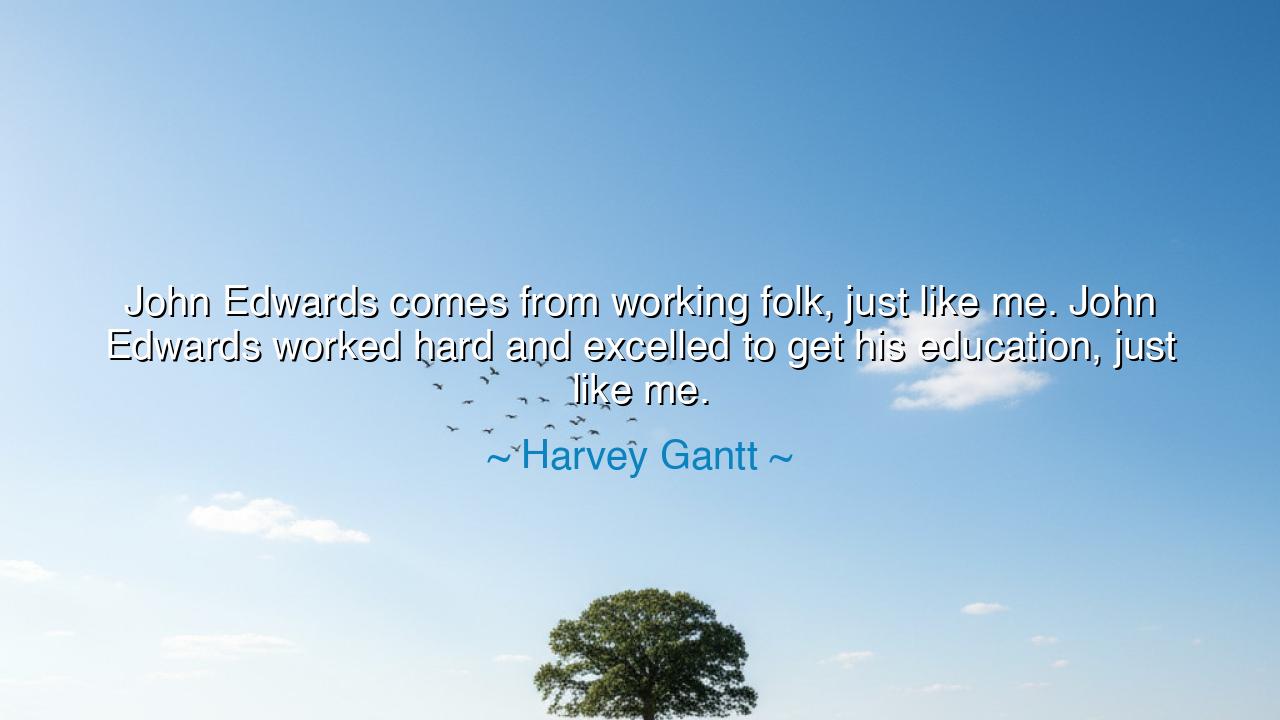
John Edwards comes from working folk, just like me. John Edwards
John Edwards comes from working folk, just like me. John Edwards worked hard and excelled to get his education, just like me.






In the words of Harvey Gantt: “John Edwards comes from working folk, just like me. John Edwards worked hard and excelled to get his education, just like me.” These words are not spoken merely to compare two men, but to reveal an ancient and enduring truth—that greatness is not born of privilege alone, but often arises from the humble strength of the working folk, those who toil with their hands and sweat with their brow. It is from such roots that resilience grows, and from such labor that the seeds of leadership are nourished.
The ancients themselves honored this truth. In Rome, Cincinnatus, a farmer of the soil, was called from his plow to serve as leader in time of crisis. He ruled with justice, restored order, and then returned to his fields when duty was done. His nobility was not in gilded halls, but in his devotion to labor and simplicity. In the same way, when Gantt speaks of Edwards as one who came from working folk, he honors the nobility of ordinary origins and the heroic spirit that can rise from them.
To say that one “worked hard and excelled to get his education” is to remind us that knowledge is not always handed down like an inheritance—it is often won through struggle, perseverance, and sacrifice. Consider Abraham Lincoln, born in a log cabin, who studied by firelight after long days of manual labor. His greatness as a leader was forged not in comfort, but in hardship. His story mirrors the spirit of Edwards and Gantt, who labored to rise through learning, showing that education becomes most powerful when it is earned, not given.
Gantt’s words also speak of kinship—the recognition that men and women who share the same struggles are bound together across generations and across fields of work. When he says, “just like me,” he draws strength not from comparison, but from solidarity. He reminds us that the story of one is often the story of many—that the victories of individuals are born from the sacrifices of families, of communities, of entire classes of working folk who dream that their children might rise higher than themselves.
History gives us many such pairings. Frederick Douglass and Booker T. Washington both rose from chains and poverty into the heights of leadership and intellect, carrying the voices of their people with them. Their journeys echo the same pattern: hardship, labor, perseverance, and the triumph of education. Their lives testify, as do the words of Gantt, that greatness does not demand a gilded cradle, but a determined spirit.
The lesson is clear: never despise humble beginnings, for they are the forge of character. If you are among the working folk, take pride in your labor, for it builds the strength of your soul. If you are in pursuit of education, persevere, for the knowledge you win through struggle will become the foundation of your power. And if you find yourself in a place of leadership, remember your roots, and honor those who labor without glory, for they are the bedrock upon which you stand.
Therefore, O listener, take these words into your heart: greatness is not sealed by birth, but carved by effort. The measure of a man or woman is not the ease of their path, but the courage with which they climb it. Like Gantt and Edwards, like so many before them, you too can rise from humble origins into noble purpose. Work with diligence, study with passion, and never forget the dignity of where you come from. For in the story of the working folk lies the eternal truth: that from the lowest soil can rise the tallest tree.






AAdministratorAdministrator
Welcome, honored guests. Please leave a comment, we will respond soon